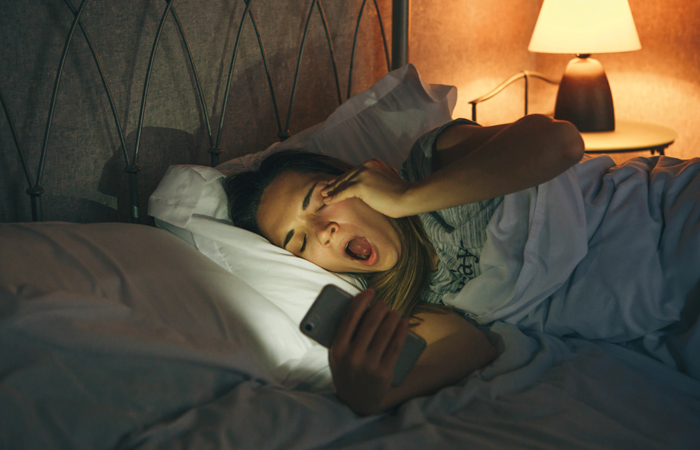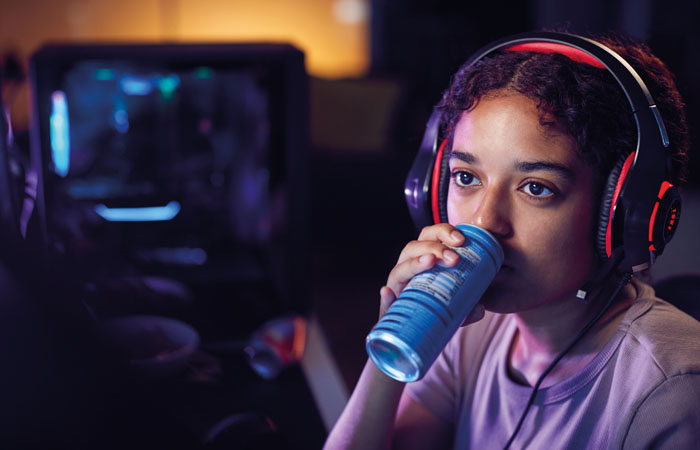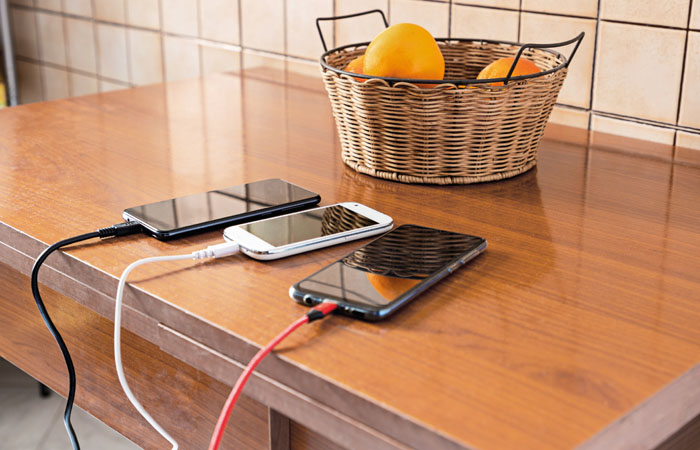Tackling teenage sleep issues
In Conditions
Follow this topic
Bookmark
Record learning outcomes
With the number of young people failing to get enough sleep already high, the Covid-19 pandemic has exacerbated an already tired situation. Discover the impact this is having on health
In a world filled with distractions, it’s not surprising that young people are missing out on sleep. But now, many months after the start of the Covid-19 pandemic, it is becoming increasingly apparent that a lack of sleep is a serious health issue.

One in four 11- to 15-year-olds aren’t getting enough sleep and 27 per cent now say they are too tired to concentrate on lessons at school. This is according to a report published by the World Health Organization (WHO) in early 2020, as part of its ‘Health Behaviour in School-aged Children’ study.
Since 2014, the number of young people who reported not having enough sleep to concentrate on schoolwork increased by five per cent. The added effects of lockdown have reportedly played havoc on sleeping habits, compounding the problem.
Pharmacy teams can provide advice to both parents and young people to encourage good sleep habits, putting worries to bed during these uncertain times.
Struggling to sleep
An irritable teenager is not an uncommon phenomenon, but moodiness is just a stepping-stone to other problems caused by a lack of sleep. “Just one night of interrupted sleep negatively affects mood, attention span and cognitive ability,” says Lisa Artis, deputy CEO of the Sleep Charity. “Each hour of sleep lost per night is associated with a temporary loss of one IQ point. Chronic sleep debt can have a seriously damaging effect on our mental and physical health.”
Understanding why young people are struggling to sleep is the first step towards a solution, and there are many factors that could be involved.
Optimal hours
So, on average, how much sleep should young people get?
• Newborn to 12 months: 14-15 hours
• 1-3 years: 12-14 hours
• 3-6 years: 10-12 hours
• 7-12 years: 10-11 hours
• 12-18 years: 7-9 hours
These timings differ for adults, who require an average of six to nine hours a night, which decreases with age.
Technology
Young people are becoming more reliant on technology as new innovations are constantly making working, socialising, entertainment, shopping and countless other areas of life even easier with the simple click of a button or swipe of a screen. But while these may be convenient, it’s not all fun and games when it comes to their knock-on effects. “The problem with sleep in this day and age is that there is so much competition for our time, such as social media and streaming services,” says Neil Stanley, director of sleep science for the sleep improvement programme Sleepstation. “This is probably the biggest cause of poor sleep in young people.”
Phones, computers, TVs and video games are designed to keep people engaged, making them often hard to turn off. In addition, the blue light emitted by screens is reported to supress the natural production of melatonin that encourages sleep. It also affects the body’s circadian rhythms making it harder to both fall asleep and stay asleep.
Diet
Consuming drinks high in sugar and caffeine before bed can be detrimental to sleep. Some nine per cent of young people aged 11-15 years reported consuming energy drinks at least two to four times a week, and three per cent of all young people reported drinking energy drinks at least daily, according to the WHO report. And it is not just caffeinated drinks that are a problem, as some chocolate bars can have as much caffeine in them as a fizzy drink, according to The Sleep Council. Unusual eating habits, such as eating large meals late at night, can cause indigestion and discomfort, which can also affect sleep.

Covid-19
The Covid-19 pandemic has caused much disruption to normal life. In particular, regular school schedules were upheaved, which was difficult for many young people to adjust to and return to, and uncertainty remains.
The Mental Health Foundation (MHF) reported that young people were impacted by loneliness, isolation and a lack of engagement as a result of the first lockdown. In a survey carried out in April 2020, the charity found that young people were almost three times more likely to have experienced loneliness during lockdown, with almost half (44 per cent) feeling this way.
These issues have caused a surge in feelings of anxiety in many younger people, the knock-on effects of which can drastically affect sleep quality.
A survey carried out during the first lockdown by The Sleep Charity, The Sleep Council and Sleepstation, found that as many as 70 per cent of children under 16 were going to bed later and 57 per cent were waking later, showing a significant change in bedtime schedules. A third (33 per cent) of children were found to be sleeping longer than normal, and nearly two in 10 were sleeping less. If these shifts persist, especially now a second lockdown is underway, there could be a significant impact on physical, mental and emotional health and wellbeing going forwards.
In addition, reliance on technology for work, learning and entertainment has reportedly gone into overdrive during the pandemic. The survey revealed that nearly three quarters (74 per cent) of parents found their children using electronic devices, such as TVs, tablets, gaming machines and phones, significantly more during lockdown. These distractions encourage young people to stay up later and negatively impact sleep due to the impact of blue light.
Vicki Dawson, CEO of The Sleep Charity, says: “Ideally, we would advise parents that all screens – including the TV – are turned off at least an hour before bedtime so that melatonin levels (the sleepy hormone) can increase.”
Each hour of sleep lost per night is associated with a temporary loss of one IQ point
Slippery slope
Sleep is an essential human function, and not getting enough can have a lasting impact on physical and mental health. A lack of it often works in a negative cycle: the reasons why people may be struggling to sleep can be worsened by not enough sleep. For example, poor sleep can increase the risk of having mental health issues and mental health issues can make it harder to sleep.
Physical health concerns
Many people may not be aware that a lack of sleep can make them prone to physical health problems. “Regular poor sleep puts you at risk of serious medical conditions, including obesity, heart disease and diabetes – and it shortens your life expectancy,” says Lisa. “A good night’s sleep is vital as a restorative time and plays a significant role in healing and repairing the heart and blood vessels. It also gives the immune system and the cardiovascular system a rest and allows other organs to be restored.”
Young people should be made aware that the decisions they make about their sleep now, might affect their health in the future. But if young people are struggling to see that far ahead, pharmacy teams can help them see the impact a lack of sleep can have on their physical health right now. This can start with how it can affect their cravings and diet, potentially leading to obesity. “We don’t know exactly why there is a link between poor sleep and obesity, but some studies have found that lack of sleep can affect the hormones that control appetite, potentially making us feel hungrier,” says Bridget Benelam, nutrition scientist from the British Nutrition Foundation. “When tired, we may also be more vulnerable to making less healthy choices, such as sweet or fatty snack foods and we may be less likely to be active.”
Mental health concerns
A lack of sleep reduces a person’s ability to deal with stress and worries. According to the report ‘Taking Sleep Seriously: Sleep and our Mental Health’, published by the MHF in October 2020, two thirds of teenagers (66 per cent) aged 13-19 said that poor sleep has a negative effect on their mental health.
This is potentially problematic, as difficulty sleeping in late childhood has been found to predict depression in adolescence, and some evidence suggests that a lack of sleep is linked to suicidal thoughts in young people, adds the report.
“Sleep is a ‘need to have’, just like oxygen, water and food,” says Professor Colin Espie, sleep medicine specialist from the University of Oxford and expert adviser for the report. “We need to value and prioritise the benefits of sleep, because good sleep has a very significant positive impact on our mental health.”
Therefore, identifying and addressing problems with sleep is crucial to avoid any knock on effect to quality of life.
Sleep benefits
Pharmacy teams can demonstrate the important benefits of sleep to younger people, including:
• Better memory, which can help with school and exams
• Staying at a healthy weight
• Having good skin
• Having more energy to hang out with friends
• Being able to concentrate better, making goals easier to achieve.
Improving sleep
All things considered, sleep is important. Therefore, issues should be addressed early so children do not carry poor sleep habits into adulthood. Pharmacy teams can support parents in encouraging good sleeping habits in their children, and help young people improve their relationship with sleep in several ways:
1. Spot the signs
Parents can be on the lookout for when their children might not be getting enough sleep, starting with how they act. “You may notice an increase in daytime behaviour issues, irritability, aggression, disruptive behaviour and hyperactivity,” explains Lisa. “An increase in appetite and desire for sugary foods is also an indicator. You may find they are slow to wake up in the morning and have low energy.”
A lack of concentration, poor memory and clumsiness are also signs of sleep deprivation. Sleep also benefits the immune system, so a child who is regularly poorly could be a warning sign. “Lack of sleep can make children more susceptible to illness so if you have a child who has a frequent cough, cold or infection, consider looking at how well they are sleeping,” Lisa adds.
2. Talk it out
Parents can also be advised to ensure they talk to their children about their feelings and worries. Pharmacy teams can signpost both parents and young people to further mental health support if necessary.
Signposting suggestion: Childline: mental health.
3. Schedule sleep
Keeping regular bedtime and waking hours can help to establish a routine for the internal body clock to get used to. Even if the optimum number of hours were not achieved the previous night, getting up at the same time will be less disruptive to sleep than trying to catch up on sleep in the morning.
“It is important to try and keep a routine,” says Neil. “It does not have to be the pre-Covid routine, but it should be a routine nonetheless. Also, it is important to create a restful environment to lessen any anxieties that there may be.”
4. Wind down
Unlike machines, the human body cannot be turned off with the flick of a switch. As Neil suggests, a restful environment is key and, therefore, including a period of relaxation before bedtime can help in preparing both the mind and body for sleep. This could include turning on softer lighting, reading a book, taking a warm bath, or practising gentle yoga.
5. Put the phones to bed
It is best to avoid looking at electronic screens, such as phones and computers, in the hour before bed in order to limit the suppression of melatonin that comes about as a result of the blue light. In addition, to help avoid distraction, phones and other electronic devices could be left in a different room or turned off for the night.

6. The right exercise
It is recommended that teenagers get around 60 minutes of exercise a day. This is beneficial to health in general, but is a particularly good aid for sleeping as it tires the body out and releases pent up tension, getting it ready for a period of rest and recovery. However, vigorous exercise should be avoided up to two hours before bedtime, as this can make falling asleep difficult.
7. Eat aware
“It’s good to avoid eating heavy meals close to bedtime as this can make us feel uncomfortable when trying to sleep,” says Bridget. It’s also best to avoid drinks containing caffeine such as tea or coffee near to bedtime.” In fact, caffeinated food and drinks, such as chocolate, tea, coffee and energy drinks should be avoided four to five hours before bedtime.
8. Sleep friendly
Making a room sleep friendly can encourage a good night’s sleep. This includes removing distractions such as electronics, toys and games and schoolwork from the bedroom. But it also means ensuring the room is a good, cool temperature, quiet and dark. Eye masks may be a helpful aid if a dark room is hard to achieve.
The lady doth sleep too much, methinks
Can someone have too much sleep? Lisa Artis, deputy CEO of The Sleep Charity, says that they can.
“While there is no ‘one size fits all’ when it comes to sleep, most people average around 6-9 hours per night,” she says. “Sleeping too much has been linked to a number of health conditions, such as heart disease and obesity. If you find you need to frequently sleep longer than this to feel refreshed it may be worth looking if there are any underlying issues. “
This is the case for adults, but the same can be said for children and young people and so advising parents to be vigilant when it comes to their children’s sleep schedules is important.
